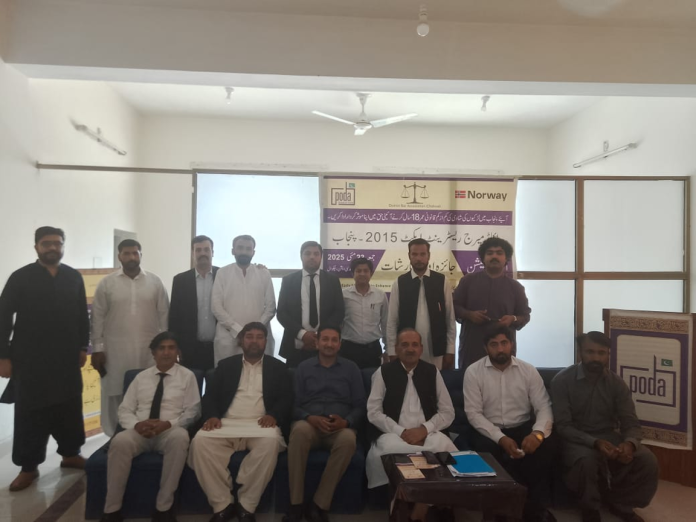CHAKWAL, FRIDAY MAY 24 (DNA) : The participants of a consultative session organized by PODA urged the government to raise the minimum legal age of marriage for girls in Punjab—and across the country—to 18 years, to 18 years of age. To support this reform, they called for the introduction and implementation of an online marriage registration system linked to National Identity Card (NIC) verification. This step, they emphasized, would help streamline efforts to prevent underage marriages. The urgency of this demand is underscored by the fact that Pakistan ranks sixth globally in terms of the prevalence of child marriage, highlighting the critical need for decisive legal and administrative action.
The consultative session brought together 20 legal professionals, including a visible presence of female lawyers, to assess current laws and explore ways to strengthen enforcement and raise awareness. The initiative is part of PODA’s ongoing three-year project “Reduce Early Marriages to Enhance Gender Equality” supported by Norwegian Embassy, Islamabad focused on promoting gender equality and preventing child marriages in Punjab.
Pakistan continues to struggle with high rates of child marriage, particularly in rural and underdeveloped areas. “An extensive community outreach effort—including awareness sessions with mothers on Sexual and Reproductive Health and Rights (SRHR), workshops with Basic Health Unit (BHU) staff, and engagements with community influencers—has revealed that the actual number of child marriages significantly exceeds reported figures. These findings validate estimates by international organizations such as UNICEF, but they also raise serious concern, as the ground reality appears to be even more alarming than previously assumed. The persistence of unreported cases highlights the urgent need for systematic data collection, community-based interventions, and comprehensive legal enforcement to address the full scale of the crisis,” said Sohail Yousaf, project coordinator.
During the session, Advocate Atiqu-u-Rasool provided an in-depth review of the penalties under the Punjab Child Marriage Restraint Act 2015 and advocated for the mandatory online registration of marriages to ensure age verification and accountability.
Advocate Khawaja Zahid Naseem presented a comprehensive legal analysis of child marriage laws across Pakistan, emphasizing key judicial rulings. He referenced the Federal Shariat Court’s 2023 judgment in the Ali Azhar vs. Province of Sindh case, which upheld the government’s authority to legislate a minimum marriage age of 18 for both boys and girls, affirming that such legislation does not contradict Islamic principles.
He further cited the 2024 Lahore High Court decision in “Azka Wahid vs. Province of Punjab,” which declared that setting different marriage ages for boys (18) and girls (16) violates Article 25 of the Constitution, which ensures gender equality. The court directed the Punjab government to amend the law within 15 days to align with constitutional and human rights standards.
Participants also acknowledged recent progress, including the Islamabad Capital Territory’s legislation, which sets the minimum marriage age at 18 for both genders. They stressed the urgent need for uniform child marriage legislation across all provinces to ensure legal clarity and equal protection for all children in Pakistan.
Faisal Kahut, former Vice President of the District Bar Association Chakwal, suggested updating the Nikah Nama (marriage contract) to reflect modern needs, including digital verification to prevent underage marriages.
The session reaffirmed the legal community’s commitment to protecting the rights of children and ensuring that every girl has the opportunity to live a safe, healthy, and empowered life.

















